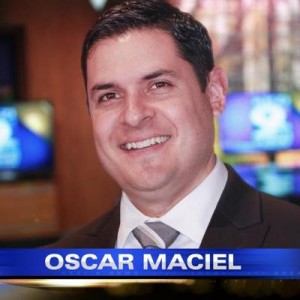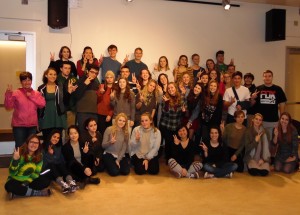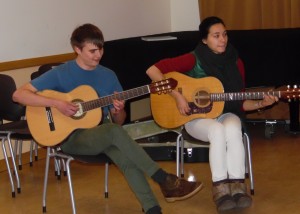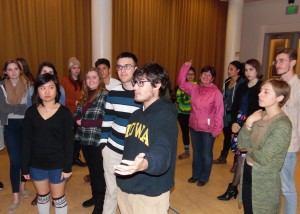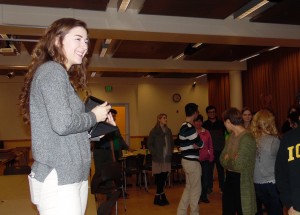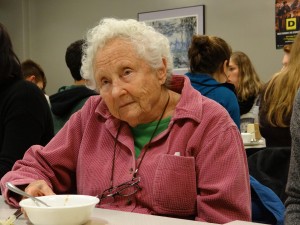 On Wednesday, January 13, the CGO had the privilege of having Eugene’s very own Betty Taylor as our guest speaker. Ms. Taylor is 90 years old and an almost 20-year member of the Eugene City Council. Before becoming a politician in Eugene, she was also a teacher in Springfield, Illinois. Although she has hesitations because of her age, she will be running for city council again this coming May of 2016.
On Wednesday, January 13, the CGO had the privilege of having Eugene’s very own Betty Taylor as our guest speaker. Ms. Taylor is 90 years old and an almost 20-year member of the Eugene City Council. Before becoming a politician in Eugene, she was also a teacher in Springfield, Illinois. Although she has hesitations because of her age, she will be running for city council again this coming May of 2016.
Ms. Taylor helped us see some of the issues in Eugene and some of the ways ethics and politics intersect. For example, she noted how many other people on council have been “seduced” into changing their mind or supporting an issue by those with money and power. Betty, however, has never given in to that seduction. In fact, she often votes against the majority, sometimes being the only one against the rest of the council to vote a certain way. We didn’t get the impression that this bothered her in the slightest; she always stands up for what she believes in and doesn’t give in to the pressure.
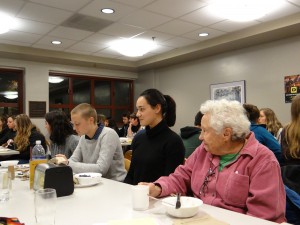
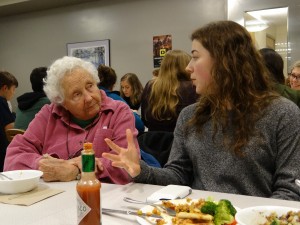 Other ethical situations she addressed were lying to news sources and negatively campaigning against opponents. She says she believes it is ethical to call people out when they are lying when that other person is present (once a man said he attended all the homeowners meetings and she told him that was funny because she never saw him there) but she doesn’t like negative campaigning in general or behind someone’s back. She does not believe in broadcasting people’s personal business for her own gains and does not believe that second-hand sources are credible sources.
Other ethical situations she addressed were lying to news sources and negatively campaigning against opponents. She says she believes it is ethical to call people out when they are lying when that other person is present (once a man said he attended all the homeowners meetings and she told him that was funny because she never saw him there) but she doesn’t like negative campaigning in general or behind someone’s back. She does not believe in broadcasting people’s personal business for her own gains and does not believe that second-hand sources are credible sources.
One of the current cases Ms. Taylor is dealing with while in office is the future plans for Kesey Square. A group of local businessmen are looking to build a six story apartment building on the Broadway Plaza that has a statue paying homage to the late author Ken Kesey. Ms. Taylor opposed the building of the apartment complex and says it is one of the last open spaces in the downtown area. She also opposed the renaming of Centennial Boulevard to Martin Luther King Boulevard. She believed that the name Centennial Boulevard had its own historical significance. She also saw it as a chance to raise awareness about the MLK Park, which only a few people seem to know about. Because the fight over renaming was so contentious, she has suggested naming an as-yet un-named bridge after MLK.
Ms. Taylor also spoke briefly about her time as a teacher in Illinois in the 1960s. She said, a bit humorously, that she didn’t know why she wasn’t fired from teaching. The principle heard her talking about race several times, and she even got in trouble for walking next to a black professor to lunch. Even before becoming a politician, Ms. Taylor stood up for what she believed in.
Overall, Ms. Taylor was quite an inspiration to us. She was very funny, straightforward, and personal during her talk. We admire the way she does what she thinks is right, doesn’t mind standing alone, and continues to be involved in politics even when her age may become a barrier to her. We wish that she was in our city district so we could vote for her next year for city Council.
